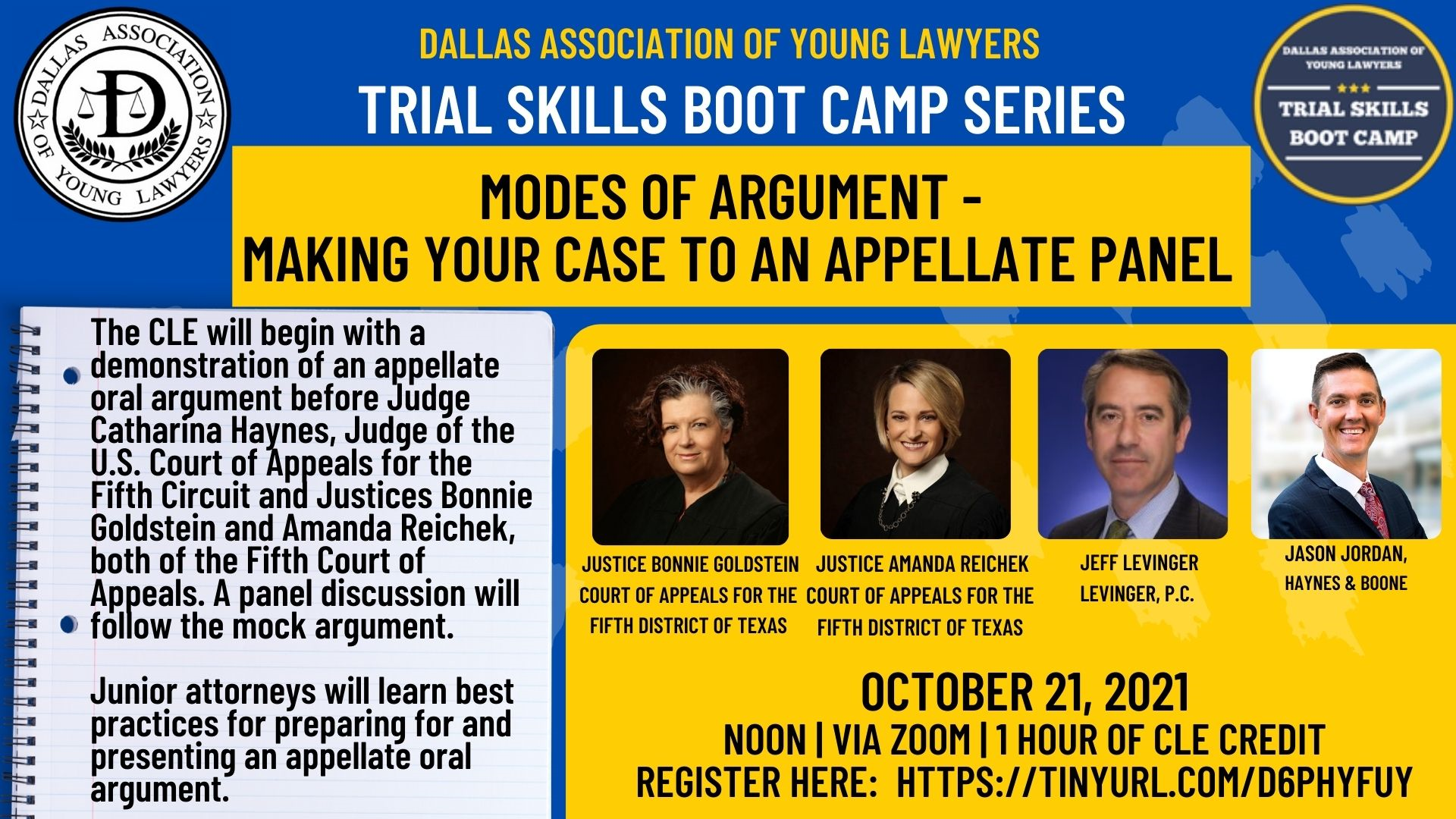I recently wrote an article, “Federalism and Appellate Procedure: Five Texas-Federal Differences to Know,” in the Appellate Advocate, the quarterly publication by the Appellate Section of the State Bar of Texas. I hope you find it interesting and useful.
Monthly Archives: October 2021
The panel opinion in Dickson v. The Afiya Center affirmed the denial of a TCPA motion to dismiss as to allegedly defamatory statements related to a municipal anti-abortion ordinance. The full court has now denied en banc review, over a dissent focusing on the historically contentious nature of public discussion on the subject.
In addition to other points about “apex depositions,” the supreme court rejected an argument that an unreasonable delay barred mandamus relief:
“American reasonably explained the year-long period between the trial court’s order compelling Eberwein’s deposition and American’s mandamus filing in the court of appeals. The record establishes that American did not receive notice of the order until four months after its issuance. At that point, the parties were on notice that the order set preconditions to Eberwein’s deposition by requiring Arnette to serve a new deposition notice designating deposition topics. To date, neither has occurred, with no explanation on Arnette’s part. As the trial date loomed, first in December 2020 and now in December 2021, American prudently sought mandamus relief to avoid the necessity of rescheduling the trial. On this record, the delay is neither unexplained nor unreasonable.”
In re American Airlines, Inc., No. 20-0789 (Oct. 22, 2021) (per curiam) (reaching a different conclusion than the Fifth Court of Appeals did in 2020.
 The Fifth Court reminded about a basic requirement for mandamus relief in In re Chron: “[W]e conclude that relator has failed to demonstrate that he sought relief in the trial court for the alleged abuse of discretion before bringing his petition for writ of mandamus before this court. Accordingly, we deny the petition for writ of mandamus without prejudice to refiling a petition with a record that reflects that the predicate request requirement has been met.” No. 05-21-00899-CV (Oct. 21, 2021) (mem. op.) (applying In re: Coppola, 535 S.W.3d 506, 50 (Tex. 2017) (orig. proceeding)).
The Fifth Court reminded about a basic requirement for mandamus relief in In re Chron: “[W]e conclude that relator has failed to demonstrate that he sought relief in the trial court for the alleged abuse of discretion before bringing his petition for writ of mandamus before this court. Accordingly, we deny the petition for writ of mandamus without prejudice to refiling a petition with a record that reflects that the predicate request requirement has been met.” No. 05-21-00899-CV (Oct. 21, 2021) (mem. op.) (applying In re: Coppola, 535 S.W.3d 506, 50 (Tex. 2017) (orig. proceeding)).
Even on a court that has strong differences of opinion about the law that defines the boundary between the judicial process and arbitration, some questions command consensus–in Holifield v. Barclay Properties, Ltd., the Fifth Court agreed that “a bilateral agreement to arbitrate under the AAA rules constitutes clear and unmistakable evidence of the parties’ intent to delegate the issue of arbitrability to the arbitrator.” No. 05-21-00239-CV (Oct. 5, 2021) (mem. op.) (citations omitted).
The Fifth Court reversed a sanctions award arising from a discovery dispute involving a subpoena to a health-care provider, finding weaknesses in the supporting record that included these matters:
- Technical problems with the subpoena papers. “Incomplete preparation and service of the subpoena, however, is not evidence of Allstate’s bad faith, harassment, or improper purpose necessary to overcome the presumption that pleadings are made in good faith.”
- Other litigation. “ROSIT’s allegations of sanctionable conduct rest on its contention that, based on a history of intentional noncompliance in other cases, Allstate intentionally failed to comply with the requirements for service of a subpoena and then filed the motion in bad faith, for an improper purpose, and to harass ROSIT. The trial court’s findings of sanctionable conduct were based in part on this history. But Allstate’s motion for sanctions with its attachments was limited to ROSIT’s noncompliance with service in this case.”
- Alleged discovery agreement. “In its motion and at the hearing, and as reflected in the trial court’s findings and conclusions, ROSIT complained of Lexitas’s ‘repeated refusal to comply’ with an alleged agreement regarding service of depositions on written questions directed to ROSIT in this and other cases. Although the trial court cited this failure in its findings, no evidence of any such agreement was admitted.”
Allstate Property & Casualty Co. v. Ford, No. 05-20-00463-CV (Oct. 15, 2021) (mem. op.).
 The annual Appellate Judges Education Institute, hosted by the Appellate Judges Conference, an arm of the American Bar Association’s Judicial Division, will be held November 11-14, 2021, at the Hyatt Regency in Austin, Texas. This Appellate Summit offers four days of advanced-level appellate educational programming and is the largest nationwide gathering of appellate jurists and advocates. The most recent Summit sold out and the ABA had to cut off registrations early. Early-bird registration for the 2021 Summit is now open through October 15, 2021. Over 100 judges from throughout the country have already signed up for the Summit.
The annual Appellate Judges Education Institute, hosted by the Appellate Judges Conference, an arm of the American Bar Association’s Judicial Division, will be held November 11-14, 2021, at the Hyatt Regency in Austin, Texas. This Appellate Summit offers four days of advanced-level appellate educational programming and is the largest nationwide gathering of appellate jurists and advocates. The most recent Summit sold out and the ABA had to cut off registrations early. Early-bird registration for the 2021 Summit is now open through October 15, 2021. Over 100 judges from throughout the country have already signed up for the Summit.
This year’s summit features speakers on the following topics, among others:
- How Judges Read in an E-filing Era
- Top-Notch Oral Argument Answers
- Managing Stress and Strengthening Resiliency: Practical Strategies for Judges and Lawyers
- Building and Growing an Appellate Practice
- Supreme Court Preview
- Writing from the Reader’s Perspective: How the English Language Really Works
- United States Supreme Court Civil Update
- Storytelling for Advocates and Judges: How and Why We Should Incorporate Storytelling Techniques and Themes into our Work
Panelists include:
Erwin Chemerinsky, Dean of the University of California, Berkeley, School of Law
Hon. Nathan Hecht, Chief Justice, Texas Supreme Court
Hon. Bridget Mary McCormack, Chief Justice, Michigan Supreme Court
Hon. Albert Diaz, United States Court of Appeals for the Fourth Circuit
Hon. James Earl Graves Jr., United States Court of Appeals for the Fifth Circuit
Hon. Consuelo Callahan, United States Court of Appeals for the Ninth Circuit
Hon. Steven H. David, Indiana Supreme Court
Hon. Marsha Ternus, former Chief Justice, Iowa Supreme Court
Hon. Samuel A. Thumma, Arizona Court of Appeals
Hon. Martha Warner, Fourth District Court of Appeal, Florida
Hon. David W. Ellis, Illinois Court of Appeals and best-selling author
Kannon K. Shanmugam, Partner, Paul, Weiss, Rifkind, Wharton & Garrison LLP
George Gopen, Ph.D., Professor Emeritus of the Practice of Rhetoric, Duke University & Consultant on Writing the English Language
The summit will be taking place in a hotel that will easily accommodate social distancing for attendees and presenter. The ballroom boasts over 14,000 square feet and a ceiling height of 22 feet. It is rated to hold more than 1,000 attendees during normal times, but will be capped at 400 attendees. Round tables will be set with no more than 4-5 seats instead of the usual 7 to 8. The opening reception at the Bullock Museum will be held in the museum’s Grand Lobby, which has a capacity of 600. Additionally, a color coding system, to reflect your social distancing preference, will be offered at registration. Meals also will have enhanced safety measures.
For further details on speakers, programs, and registration, go to: https://lnkd.in/exxjtGjA.
 The appellant in Square 9 Softworks v. SIPS Consults Corp. appealed the denial of its special appearance, arguing that because it proved itself to be a nonresident, that showing sufficed in the absence of adequate jurisdictional allegations. Unfortunately, it did not appeal the striking of the declaration that would have established that matter:
The appellant in Square 9 Softworks v. SIPS Consults Corp. appealed the denial of its special appearance, arguing that because it proved itself to be a nonresident, that showing sufficed in the absence of adequate jurisdictional allegations. Unfortunately, it did not appeal the striking of the declaration that would have established that matter:
“In this case, however, even if we assume SIPS failed to plead sufficient jurisdictional facts, the only evidence submitted by Square 9 to prove it was not a Texas resident, and the only evidence it points to on appeal, is the sworn declaration signed by Frattini that was struck in its entirety from the record by the trial court. Square 9 does not challenge the trial court’s striking of the sworn declaration. Accordingly, we cannot consider the declaration as part of the evidence to be considered on appeal.”
No. 05-20-01116-CV (Oct. 11, 2021) (mem. op.)
The original incarnation of the TCPA was widely criticized for broad language that included a wide range of civil litigation. After its amendment, opinions such as CBS Stations Group v. Burns remind that, at its core, the TCPA serves an important role in protecting First Amendment rights; here, a local TV station’s coverage of a bank robbery:
“We conclude Burns failed to present clear and specific evidence that CBS knew or should have known that publication of the photograph in connection with the report on the robbery was false. Further, there is no evidence supporting a conclusion that a photograph obtained from a law enforcement agency after a public–information-act request using the correct name and birth date of the individual would warn a reasonably prudent broadcaster of its defamatory potential.”
No. 05-21-00042-CV (Sept. 27, 2021) (mem. op.). Of special note, the panel includes Justice Ken Molberg, author of Dyer v. Medoc Health Services, 573 S.W.3d 418 (Tex. App.–Dallas 2019, pet denied), which thoroughly reviewed and significantly limited the TCPA’s protection of the right of association, compared to some earlier opinions by other courts of appeal on the topic.
 These facts led to a problem with the timeliness of the notice of appeal in Jordan Kahn Music Co. v. Threlkeld:
These facts led to a problem with the timeliness of the notice of appeal in Jordan Kahn Music Co. v. Threlkeld:
- January 19, 2021. Trial court signs interlocutory order granting a TCPA motion to dismiss, and orally invites the movant to submit a fee affidavit;
- February 28, 2021. Trial court signs a final judgment, including a fee award.
- Nonmovant timely moved for a new trial.
- May 24, 2021. Notice of appeal filed.
The Fifth Court held that the February 28 judgment was a “trial court order on a motion to dismiss … under section 27.003” under the relevant statute, and thus triggered the 20-day deadline for perfecting an accelerated appeal–for which, the filing of a motion for new trial does not extend the perfection deadline is it otherwise would. No. 05-21-00381-CV (Sept. 29, 2021) (mem. op.).
Texas rules about preservation of no-evidence points are generally more forgiving than the federal rules, although they are not without nuance, one of which became important in American Pride Xpress Logistics v. Joe Jordan Trucks: “Although [Appellants] moved for a directed verdict after appellee rested, and the trial court denied the motion, they proceeded to present their own evidence and did not re-urge the motion for directed verdict when the evidence closed. ‘If a party proceeds to present evidence after that party has moved for a directed verdict, such party must reurge the motion for directed verdict at the close of the case, or any error in its denial is waived.'” No. 05-20-00281-CV (Sept. 24, 2021) (mem. op.) (citation omitted).
